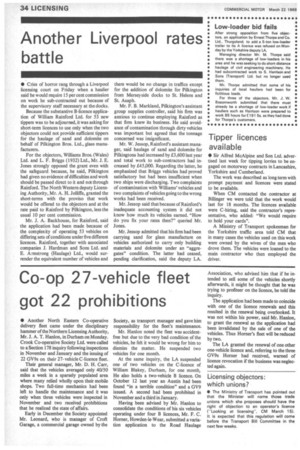Another Liverpool rates battle
Page 36

If you've noticed an error in this article please click here to report it so we can fix it.
• Cries of horror rang through a Liverpool licensing court on Friday when a haulier said he would require 15 per cent commission on work he sub-contracted out because of the supervisory staff necessary at the docks.
Because the substantive B-licence application of William Rainford Ltd. for 53 new tippers was to be adjourned, it was asking for short-term licences to use only when the two objectors could not provide sufficient tippers for the haulage of sand and dolomite on behalf of Pilkington Bros. Ltd., glass manufacturers.
For the objectors, Williams Bros. (Wales) Ltd. and L. F. Briggs (1932) Ltd., Mr. J. E. Jones strongly opposed the grant even with the safeguard because, he said, Pilkington had given no evidence of difficulties and work should be passed direct to it and not through Rainford. The North Western deputy Licensing Authority, Mr. A. H. Jolliffe, granted the short-terms with the proviso that work would be offered to the objectors and at the rate paid to Rainford by Pilkington, less the usual 10 per cent commission.
Mr. J. A. Backhouse, for Rainford, said the application had been made because of the complexity of operating 53 vehicles on differing sets of conditions under five different licences. Rainford, together with associated companies .J. Hardman and Sons Ltd. and E. Armstrong (Haulage) Ltd., would surrender the equivalent number of vehicles and there would be no change in traffics except for the addition of dolomite for Pilkington from Merseyside docks to St. Helens and St. Asaph.
Mr. F. B. Markland, Pilkington's assistant group supplies controller, said his firm was anxious to continue employing Rainford as that firm knew its business. He said avoidance of contamination through dirty vehicles was important but agreed that the tonnage concerned was insignificant.
Mr. W. Jessop, Rainford's assistant manager, said haulage of sand and dolomite for Pilkingtons had increased by £3,600 last year and total work to sub-contractors had increased by £45,000. Regarding the latter, he emphasized that Briggs vehicles had proved satisfactory but had been insufficient when two ships were discharging. Two complaints of contamination with Williams' vehicles and two complaints of vehicles going to the wrong works had been received.
Mr. Jessop said that because of Rainford's inadequate accounting system it did not know how much its vehicles earned. "How do you fix your rates then?" queried Mr. Jones.
Mr. Jessop admitted that his firm had been carrying sand for glass manufacture on vehicles authorized to carry only building materials and dolomite under an "aggregates" condition. The latter had ceased, pending clarification, said the deputy LA.












































































































